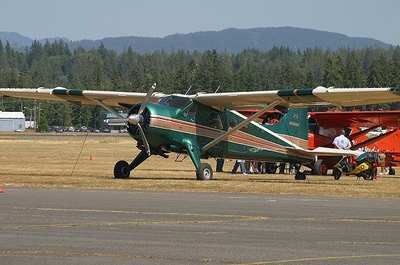Tue, Dec 21, 2021
AD 2021-24-18 Requires Determining Service Life Limits For The Wing Strut Fitting On The Main Spar
The FAA is adopting a new airworthiness directive (AD) for all Viking Air Limited Model DHC-3 airplanes.

This AD results from mandatory continuing airworthiness information (MCAI) originated by an aviation authority of another country to identify and correct an unsafe condition on an aviation product. The MCAI identifies the unsafe condition as fatigue damage of the wing strut lug fitting components and the fuselage to wing strut attachment (tie-bar). This AD requires determining service life limits for the wing strut fitting on the main spar and for the tie-bar and following instructions for removal and replacement of affected parts. The FAA is issuing this AD to address the unsafe condition on these products. This AD is effective January 24, 2022.
Supplementary Information: The FAA issued a notice of proposed rulemaking (NPRM) to amend 14 CFR part 39 by adding an AD that would apply to all Viking Air Limited Model DHC-3 airplanes. The NPRM published in the Federal Register on June 28, 2021 (86 FR 33916). The NPRM was prompted by MCAI originated by Transport Canada, which is the aviation authority for Canada. Transport Canada has issued AD CF-2017-29, dated August 24, 2017 (referred to after this as “the MCAI”), to correct an unsafe condition for Viking Air Limited Model DHC-3 airplanes.
The MCAI states:
- It has been determined that the current maintenance program does not adequately address potential fatigue damage of the wing strut lug fitting components or the fuselage to wing strut attachment (Tie Bar). Affected parts must be replaced before specified air time limits are reached to avoid fatigue cracking of the affected parts. Cracking which is not detected may compromise the structural integrity of the wing or the Tie-Bar.
- Fatigue damage occurs more rapidly on aeroplanes that are operated at higher gross weights. For that reason, the corrective actions of this [Transport Canada] AD must be accomplished sooner for aeroplanes that have been certified for operation at higher gross weights.
- Fatigue damage also occurs more rapidly on aeroplanes that are operated below 2000 feet above ground level (AGL) over land due to higher and more frequent gust and maneuvering loads. Low level flights over water are not known to produce increased fatigue damage on the DHC-3. For that reason, the corrective actions of this [Transport Canada] AD must be accomplished sooner for aeroplanes that have been operated at low altitudes over land.
This condition, if not addressed, could result in cracking and failure of the structural integrity of the wing or the tie-bar.
You may examine the MCAI in the AD docket at https://www.regulations.gov by searching for and locating Docket No. FAA-2021-0214.
In the NPRM, the FAA proposed to require determining service life limits for the wing strut fitting on the main spar and for the tie-bar and following instructions for removal and replacement of affected parts. The FAA is issuing this AD to address the unsafe condition on these products.
More News
Circle To Runway (Runway Number) Used by ATC to inform the pilot that he/she must circle to land because the runway in use is other than the runway aligned with the instrument appr>[...]
Aero Linx: National Aviation Safety Foundation (NASF) The National Aviation Safety Foundation is a support group whose objective is to enhance aviation safety through educational p>[...]
At Altitude Of About 250-300 Ft Agl, The Airplane Experienced A Total Loss Of Engine Power On November 6, 2024, at 1600 central standard time, a De Havilland DHC-1, N420TD, was inv>[...]
From 2009 (YouTube Edition): Three Hour Flight Was 'Flawless' -- At Least, Until Mother Nature Intervened For anyone who loves the aviation business, this was a VERY good day. Afte>[...]
Also: AMA Names Tyler Dobbs, More Falcon 9 Ops, Firefly Launch Unsuccessful, Autonomous F-16s The Air Force has begun ground testing a future uncrewed jet design in a milestone tow>[...]
 ANN's Daily Aero-Term (05.05.25): Circle To Runway (Runway Number)
ANN's Daily Aero-Term (05.05.25): Circle To Runway (Runway Number) ANN's Daily Aero-Linx (05.05.25)
ANN's Daily Aero-Linx (05.05.25) NTSB Prelim: De Havilland DHC-1
NTSB Prelim: De Havilland DHC-1 Classic Aero-TV: The Boeing Dreamliner -- Historic First Flight Coverage
Classic Aero-TV: The Boeing Dreamliner -- Historic First Flight Coverage Airborne-NextGen 05.06.25: AF Uncrewed Fighters, Drones v Planes, Joby Crew Test
Airborne-NextGen 05.06.25: AF Uncrewed Fighters, Drones v Planes, Joby Crew Test



